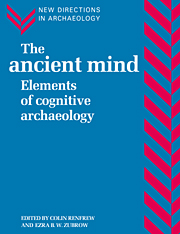Book contents
- Frontmatter
- Contents
- List of figures
- List of tables
- List of contributors
- Preface
- PART I INTRODUCTION
- PART II THE INTERDISCIPLINARY UNDERPINNING
- PART III APPROACHES TO CULT PRACTICE AND TRANSCENDENTAL BELIEF SYSTEMS
- PART IV PREHISTORIC CONCEPTIONS OF SPACE AND TIME
- PART V THE MATERIAL BASIS OF COGNITIVE INFERENCE: TECHNOLOGY
- PART VI THE MATERIAL BASIS OF COGNITIVE INFERENCE: WRITING SYSTEMS
- PART VII CONCLUSION
- 18 Cognitive archaeology reconsidered
- Index
18 - Cognitive archaeology reconsidered
Published online by Cambridge University Press: 03 December 2009
- Frontmatter
- Contents
- List of figures
- List of tables
- List of contributors
- Preface
- PART I INTRODUCTION
- PART II THE INTERDISCIPLINARY UNDERPINNING
- PART III APPROACHES TO CULT PRACTICE AND TRANSCENDENTAL BELIEF SYSTEMS
- PART IV PREHISTORIC CONCEPTIONS OF SPACE AND TIME
- PART V THE MATERIAL BASIS OF COGNITIVE INFERENCE: TECHNOLOGY
- PART VI THE MATERIAL BASIS OF COGNITIVE INFERENCE: WRITING SYSTEMS
- PART VII CONCLUSION
- 18 Cognitive archaeology reconsidered
- Index
Summary
What is cognitive archaeology?
There are two major aspects to cognitive archaeology. First, cognitive archaeology is a rather loosely-defined area including the evolution of the whole complex system of human mental abilities and their material representations. Second, there is a facet which considers how cognitive processes impact the archaeologists who do archaeology.
The first aspect focuses on what can be learned about perception, attention, learning, memory and reasoning from the study of past cultures. It is concerned with ‘when’, ‘where’ and ‘how’, in hominid and cultural evolution, cognition became such an important part of the human experience. Cognitive archaeology embraces aspects of behaviour, language and imagery. It frequently has been noted that archaeologists believe that patterns of material culture reflect the patterns of human behaviour. Yet, what has not been emphasized is that human behaviour has been goal directed as long as it has been observed. It thus reflects many cognitive issues. Archaeologists in the 1990s believe that the patterns of material culture reflect not only the patterns of social behaviour but, as importantly, the patterns of human cognition. Since language is fundamental to cognition, the archaeologists concerned with cognitive questions have tended to emphasize the development of the linguistic record.
The second aspect of cognitive archaeology focuses on what could be described as ‘reflexive’ archaeology. How do the cognitive processes of the archaeologist limit how archaeology is practised? Archaeologists are, to some extent, a product of their time and culture.
- Type
- Chapter
- Information
- The Ancient MindElements of Cognitive Archaeology, pp. 187 - 190Publisher: Cambridge University PressPrint publication year: 1994
- 12
- Cited by



